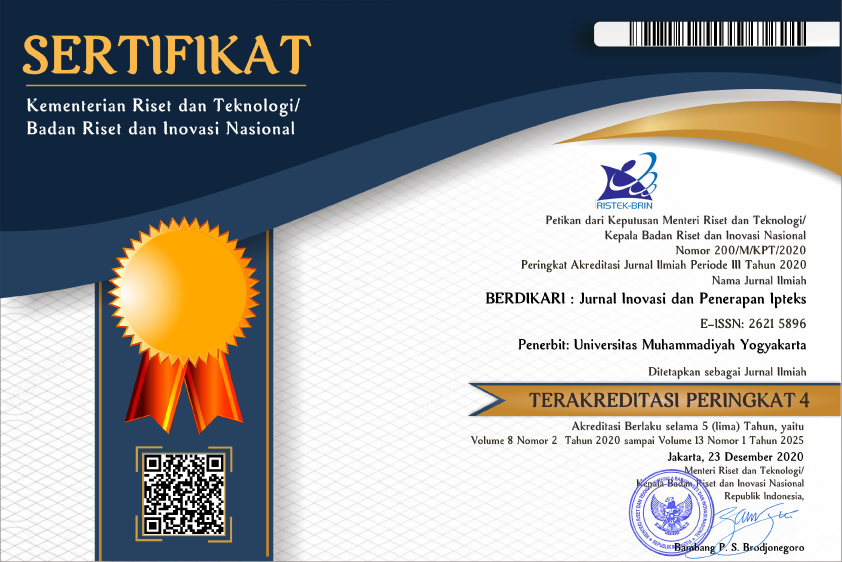Peningkatan Kapasitas Pengelolaan dan Pelaporan Dana Desa
DOI:
https://doi.org/10.18196/berdikari.v9i2.10107Keywords:
village funds, financial management, micro, small and medium enterprisesAbstract
The village fund law has mandated the government to allocate village funds for the welfare of the community in the village. Public understanding of the importance of accountability must be reported to the state is the main focus of this community service activity. This empowerment activity aimed to increase public understanding of the management and reporting funds in the Kebonsari Village, Candi, Sidoarjo Village. The program applied to learn by doing method in the form of practical learning. Activities were carried out in stages, including gathering information, implementing socialization & training, mentoring, monitoring the management, and reporting activity funds for the community. The results showed an increase in the understanding and ability of community members in managing and reporting community activity funds in Kebonsari Village with entrepreneurial activities (salted eggs), handicrafts (Sayangan), and animal husbandry (Bebek Village). A total of 17 people out of 21 residents felt the beneficial impact of the activities was shown by the level of community satisfaction. Therefore, this activity should be promoted further with a different focus according to the problems found in the community to maintain and improve accountability culture by upholding the values of integrity and transparency in the management and reports of village funds in the future.
References
Adhitama, F. (2015). Memaknai Penyusunan dan Pelaporan Akuntansi pada Rumah Sakit Blu (Studi Kasus Rsup Dr. Mohammad Hoesin Palembang). Akuntabilitas, 9(1), 53–74. Retrieved from https://ejournal.unsri.ac.id/index.php/ja/article/view/8797
Afriyanti, D., Sabanu, H. G., & Noor, F. (2015). Penilaian Indeks Akuntabilitas Instansi Pemerintah. Jurnal Tata Kelola & Akuntabilitas Keuangan Negara. https://doi.org/10.28986/jtaken.v1i1.10
Astuti, T. P., & Yulianto, Y. (2016). Good Governance Pengelolaan Keuangan Desa Menyongsong Berlakunya Undang-Undang No. 6 Tahun 2014. Berkala Akuntansi Dan Keuangan Indonesia. https://doi.org/10.20473/baki.v1i1.1694
Budiman, H., Yusnaini, Y., & Relasari, R. (2019). Pengaruh Due Professional Care dan Akuntabilitas terhadap Kualitas Audit. AKUNTABILITAS: Jurnal Penelitian Dan Pengembangan Akuntansi. https://doi.org/10.29259/ja.v11i2.8935
Ilyas Junjunan, M. (2020). Pengaruh Transparansi, Akuntabilitas, dan IGCG terhadap Tingkat Kepercayaan Muzakki di Lembaga Amil Zakat Dompet Amanah Umat. Akuntansi : Jurnal Akuntansi Integratif. https://doi.org/10.29080/jai.v6i2.289
Muryati, I. (2016). Pengelolaan Dana Bos pada SD Negeri di UPT Pelayanan Pendidikan Kecamatan Moyudan Kabupaten Sleman. Jurnal Akuntabilitas Manajemen Pendidikan. https://doi.org/10.21831/amp.v4i2.10802
Natawibawa, I. W. Y., Mulya, I. M. O., & Yoh, W. H. (2019). Transparency and Accountability as Determinants In The Financial Management Of Universities: A Study On State Universities In Malang City. Jurnal Tata Kelola & Akuntabilitas Keuangan Negara. https://doi.org/10.28986/jtaken.v5i1.247
Saud, I. M., & Trisha, G. F. (2020). Desentralisasi Fiskal, Politik Dinasti, Sistem Pengendalian Internal, Kinerja, Akuntabilitas Pelaporan Keuangan: Bukti Empiris di Indonesia. AKUNTABILITAS. https://doi.org/10.29259/ja.v14i1.11208
Downloads
Published
Issue
Section
License
Copyright
Authors retain copyright and grant BERDIKARI Jurnal Inovasi dan Penerapan IPTEK the right of first publication with the work simultaneously licensed under an Attribution 4.0 International (CC BY 4.0) that allows others to remix, adapt and build upon the work with an acknowledgment of the work's authorship and of the initial publication in BERDIKARI Jurnal Inovasi dan Penerapan IPTEK.
Authors are permitted to copy and redistribute the journal's published version of the work (e.g., post it to an institutional repository or publish it in a book), with an acknowledgment of its initial publication in BERDIKARI Jurnal Inovasi dan Penerapan IPTEK
License
Articles published in the BERDIKARI Jurnal Inovasi dan Penerapan IPTEK) are licensed under an Attribution 4.0 International (CC BY 4.0) license. You are free to:
- Share — copy and redistribute the material in any medium or format.
- Adapt — remix, transform, and build upon the material for any purpose, even commercially.
This license is acceptable for Free Cultural Works. The licensor cannot revoke these freedoms as long as you follow the license terms. Under the following terms:
- Attribution — You must give appropriate credit, provide a link to the license, and indicate if changes were made. You may do so in any reasonable manner, but not in any way that suggests the licensor endorses you or your use.
- No additional restrictions — You may not apply legal terms or technological measures that legally restrict others from doing anything the license permits.




